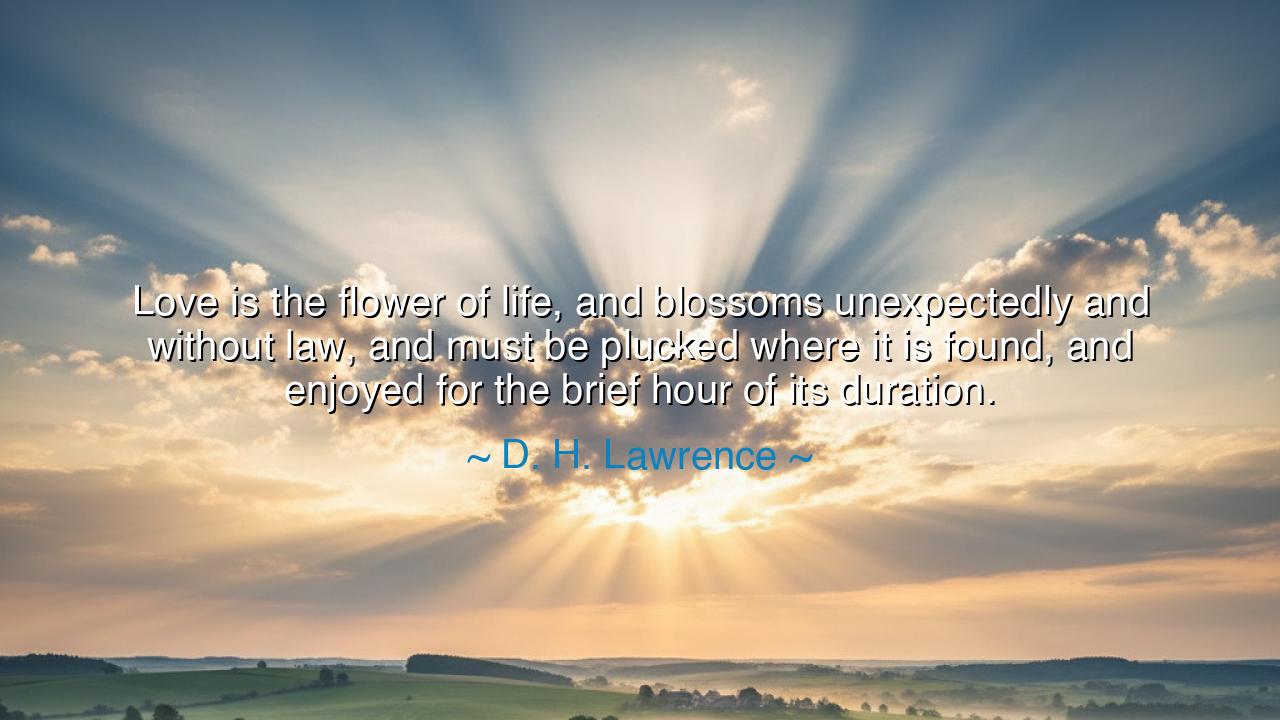
Love is the flower of life, and blossoms unexpectedly and without
Love is the flower of life, and blossoms unexpectedly and without law, and must be plucked where it is found, and enjoyed for the brief hour of its duration.






The English novelist and poet D. H. Lawrence, a man who wrote as much with his heart as with his pen, once proclaimed: “Love is the flower of life, and blossoms unexpectedly and without law, and must be plucked where it is found, and enjoyed for the brief hour of its duration.” In these words, Lawrence unveils one of the deepest truths of human existence—that love, like a flower, blooms according to no law of man, no command of reason, and no schedule of the will. It comes as it pleases, often when least expected, and it must be cherished, for its beauty is fragile and its time, fleeting. To love is to stand in awe of something both divine and mortal, eternal in meaning yet brief in form.
Lawrence, whose life and art were shaped by the passionate fires of emotion and rebellion, believed that love was the highest flowering of the human spirit—a force that transcended convention, morality, and logic. Like a flower springing from the wilderness, love does not ask permission to exist. It breaks through the hardened soil of human routine, defying rules and expectations. It cannot be legislated, nor can it be contained. It “blossoms unexpectedly,” for its nature is freedom itself. To the ancients, such love was a visitation from the gods—an immortal spark that descended upon mortals to remind them that life’s truest joy lies not in control, but in surrender.
The origin of this idea stretches back through the ages, to poets and philosophers who saw love as the soul’s awakening. The Greeks called it eros—a divine madness that lifts the heart beyond reason. In the East, mystics spoke of it as a sacred unfolding, like a lotus rising from the mud. Lawrence inherits this ancient wisdom, expressing it in the imagery of the flower, a symbol that unites all cultures. Flowers bloom only when the season allows, and when they do, they remind us that beauty cannot be forced, only received. So it is with love: it is a gift of the moment, not a possession of the will.
History itself bears witness to this truth. Consider the love of Antony and Cleopatra, that fierce and fated union between two rulers of empires. Their love blossomed without law—against duty, politics, and reason. It defied nations and ignited wars. Yet, for all its turmoil, it remains one of the most immortal tales of passion in human history. They “plucked” their love, knowing it might destroy them, yet they chose to live it fully rather than deny it. Like a flower, it was brief, radiant, and destined to fade—but its fragrance has endured across centuries. Their story teaches that the measure of love is not in its length, but in its intensity.
In Lawrence’s vision, love must be plucked where it is found, not hoarded or postponed for a more convenient time. Too many hearts wither because they fear to take the risk of love, waiting for perfect conditions that never come. But love, like a wildflower, grows in the cracks of imperfection. It asks only to be seen, embraced, and lived. The wise do not debate whether to love—they love, knowing that the bloom may be brief but that the memory will be eternal. To love even for an hour is to live more deeply than to exist a lifetime without it.
And yet, Lawrence reminds us also of the transience of this bloom: love must be “enjoyed for the brief hour of its duration.” This is not a lament, but a call to presence. The flower teaches us not to mourn its death, but to rejoice in its flowering. So too must we love without clinging—grateful for the beauty that graces our lives, even if only for a season. Those who try to imprison love destroy it; those who let it breathe, preserve its fragrance forever. True love is not about keeping—it is about experiencing.
Thus, the final lesson is one of courage, gratitude, and awareness. When love comes—whether in friendship, passion, or compassion—receive it as a sacred guest. Do not question its timing or fear its ending. Tend it with care, as a gardener tends a rare bloom, knowing that even its falling petals have beauty. Live fully in the presence of what you love, and you will have already tasted eternity.
For indeed, as Lawrence teaches, love is the flower of life—the purest expression of the soul’s vitality. It does not obey the seasons of men, nor the judgments of society. It grows where the heart allows, and fades when the time is complete. But to have loved, even once, is to have touched the divine. So when love blossoms before you, do not stand afar admiring its beauty—pluck it, cherish it, and let its fragrance fill the brief but radiant hour of your life.






AAdministratorAdministrator
Welcome, honored guests. Please leave a comment, we will respond soon